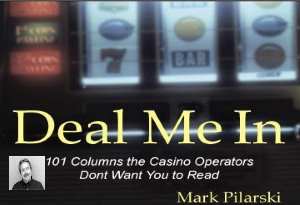Currently, I am working two crummy jobs and was looking to go into the casino business. We have three casinos in close proximity to where I live. I hear that dealers make a decent living, which I am sure is more than I am making now. Should I make the leap into the casino business? Any advice you can give me based on your dealing experience would be appreciated. Sheila S.
Most novices looking for a dealing job obtain them one of two ways. Either you attend a local dealing school and then audition, or you are hired from within after working some low-level job at the casino. Many casinos even have an internal dealing school to train new hires. If your work history file shows no major screw-ups, rarely call in sick, and management requires a few fresh dealers, you will be sent to their in-house college of dealing. The course is not a lengthy one, and you can expect to finish your training in about three weeks.
If your existing employment is asking customers if they would like to supersize their order, well then, I’d think seriously about making the leap. The benefits, Sheila, are sizable over your current work position. From my own personal experience, here are just a few.
Pay: A dealer’s pay is based mostly on tips. There are dealers pitching cardboard at the right joint in Vegas making a high, five-figure income off the gratuity of patrons. All in all, $40,000, was typical pay for where (Reno/Tahoe) and when I worked.
Inexpensive Education: In-house training for existing employees for dealer positions is typically FREE, or, about a $500 expense to learn to deal blackjack at a dealing school.
Working Conditions: In the seven different casinos that I worked in, I was never hassled. If you’re a screw up, sure, you’ll get your just deserts. Nevertheless, in the casino business, you are by and large treated fairly.
Benefits: Today’s casinos offer excellent benefits from medical coverage, bonuses, and matching 401K programs. Some casino dealers in Las Vegas have union contracts that include job security, seniority rights and other workplace protections.
The Chow: Four of the seven casinos where I was employed gave us one free meal per shift, two offered meals for as little two bucks, and one at half price.
In one casino where I worked, leftover surf ‘n’ turf and other gastronomical goodies from their first-class restaurant found their way down to the graveyard employees. I remember one employee yelling out, “enough of the crab legs already.”
Scheduling: Because most casinos offer 24-hour gaming, you can usually choose your shift. In my case, it was mostly swing shift. How else was I supposed to ski 100 days a year? Time off was also easy to get. Of all of my ridiculous requests, which were many, I do not remember ever being denied a shift off.
Breaks: How does working one hour dealing cards, and then getting a 20-minute break sound to you? That’s every hour, on the hour.
Relocation: Because many casinos are under a corporate umbrella of multiple properties, it is relatively easy to transfer from one casino to another.
Upward Mobility: Dealers climb the ladder to become pit bosses, after that a games shift manager, followed by casino shift manager, then finally running the whole joint. Several employees whom I once managed went on to running casinos across the US.
Yes, Sheila, the above might sound like sugarcoating to some, but from my casino days, this is what I experienced.
Gambling Wisdom of the Week: Sometimes the lambs slaughter the butcher. – Amarillo Slim, Big Deal (1990)




















